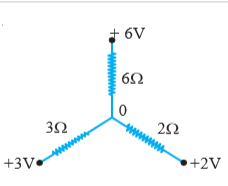What is solute potential?
Step-by-Step Text Solution:
1. Definition of Solute Potential: Solute potential, also known as osmotic potential, is a measure of the potential energy of water in a solution due to the presence of solutes. It is one of the key components that make up water potential in plants.
2. Effect of Solutes on Water: When solutes are added to water, they interact with water molecules. This interaction reduces the amount of free energy available to the water molecules. As a result, the solute potential reflects this decrease in free energy.
3. Pure Water Reference: In pure water, where there are no solutes present, the solute potential is defined as 0. This serves as a baseline for measuring solute potential in other solutions.
4. Negative Value of Solute Potential: As the concentration of solutes in a solution increases, the solute potential becomes more negative. This is because the presence of solutes lowers the water potential, indicating that the solution has a lower capacity to do work compared to pure water.
5. Conclusion: Therefore, solute potential is always a negative value, and it plays a crucial role in understanding how water moves in and out of plant cells, influencing processes such as osmosis and overall plant hydration.
---
Topper's Solved these Questions
- TRANSPORT IN PLANTS BOOK - VMC MODULES ENGLISHCHAPTER - TRANSPORT IN PLANTS EXERCISE - SOLVED EXAMPLES
21 Videos
- TRANSPORT IN PLANTS BOOK - VMC MODULES ENGLISHCHAPTER - TRANSPORT IN PLANTS EXERCISE - PRACTICE EXERCISE-(1)
5 Videos
- THE LIVING WORLD BOOK - VMC MODULES ENGLISHCHAPTER - THE LIVING WORLD EXERCISE - CHAPTER EXERCISE-D
9 Videos
Similar Questions
What is water potential ?
View SolutionWhat is a solute?
View SolutionThe more the solute molecules the (A)_____ is the solute potential (ΦS)
View SolutionWhat is the potential of junction O?

View SolutionWhat is biotic potential ?
View SolutionX and Y are adjacent living cells. The cell X has solute potential (Ψs) of -9 bars and preesure potential (Ψp) of bars wherease cell Y has solute potential (Ψs) of -8 bars and pressure potential (Ψp) of 5 bars. What will be the direction of water movement between these cells
View SolutionWhat is zeta potential?
View SolutionA plant cell is kept in a hypotonic solution. What will happen to the solute potential of this cell?
View SolutionWhat is the relation between water potential, solute potential, and pressure potential
View SolutionState the relationship between water potential and solute potential for a solution at atmospheric pressure .
View Solution
